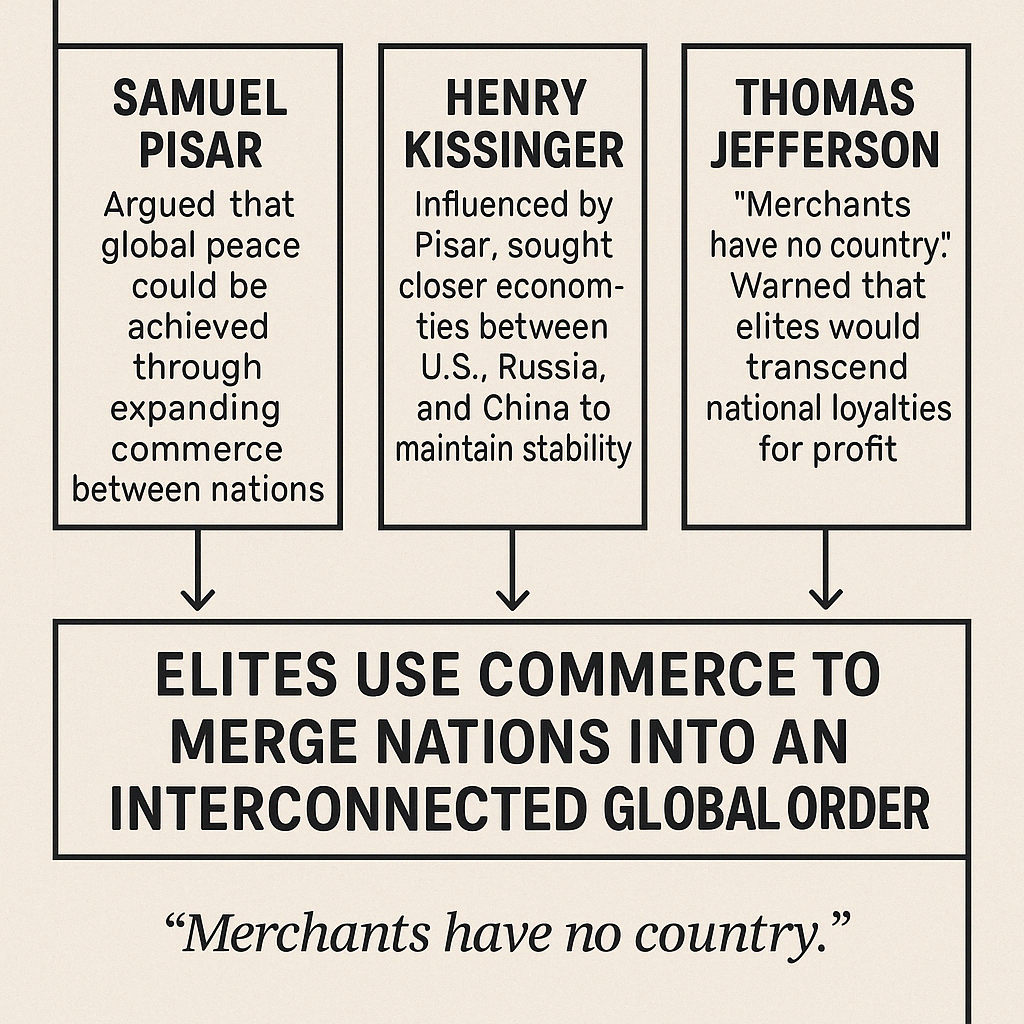Introduction: Commerce as the True Weapon of Empire
Throughout history, empires have expanded through:
- Conquest (military domination),
- Cooptation (alliances and diplomacy),
- Commerce (economic entanglement and control).
By the 20th century, the elites shifted their main strategy:
War became too costly and unpredictable. Commerce became the new battlefield.
Samuel Pisar (a major figure) laid out the intellectual framework for this transformation, which Henry Kissinger adopted and operationalized.
Meanwhile, Thomas Jefferson had already warned that merchant elites, untied to nations, would use commerce to transcend and eventually dominate national sovereignty.
Thus:
The goal became merging world powers economically — then politically — under a global elite structure that could manage humanity across old borders.
Who Was Samuel Pisar?
Samuel Pisar (1929–2015):
- Holocaust survivor,
- Top international lawyer,
- Adviser to U.S. presidents, UN leaders, and major corporations.
In 1970, he wrote the pivotal book:
Coexistence and Commerce: Guidelines for Transactions Between East and West.
Main Thesis:
World peace can be achieved not through ideological conquest or nuclear war, but through expanding commerce between nations, especially between communist and capitalist blocs.
- Trade would build mutual dependencies.
- Commerce would erase nationalistic hostilities.
- Economic interconnection would make war impractical and governance more centralized.
Translation:
- If nations are tied together economically,
- They become easier to manage and merge — without direct military conquest.
This vision is identical to what later became:
- Globalization,
- The WTO, IMF, World Bank system,
- The rise of transnational corporations,
- The weakening of national borders in favor of elite-controlled global trade networks.
Henry Kissinger: Operationalizing Pisar’s Vision
Kissinger’s genius wasn’t inventing new ideas. It was turning Pisar’s vision into statecraft:
| Pisar’s Theory | Kissinger’s Application |
|---|---|
| Commerce can achieve coexistence. | Normalize relations with China (1971) through economic engagement. |
| Economic entanglement weakens nationalist instincts. | Détente with the USSR; trade and technology sharing. |
| Peaceful interdependence over military domination. | Support for global institutions to manage disputes economically, not militarily. |
Kissinger realized:
- Military conquest creates resentment and rebellion.
- Commerce conquest creates dependence and voluntary submission.
Thus, he engineered triangular diplomacy (U.S., USSR, China) to tie them into one global system — using trade, banking, and mutual economic needs.
Not unity of hearts. Unity of wallets.
Thomas Jefferson’s Prophetic Warning
“Merchants have no country. The mere spot they stand on does not constitute so strong an attachment as that from which they draw their gains.”
Jefferson foresaw:
- Commerce nations would rise — nations whose loyalty was to profit, not patriotism.
- Merchants, bankers, and elites would detach from nations and attach to global networks.
- Commerce would become a stealth empire — an invisible government crossing borders.
Thus, today’s global elite:
- Have no true country.
- Move operations from empire to empire (Britain → America → China).
- Rule through finance, trade, and technology, not flags and armies.

The Endgame: Merging World Powers into Global Governance
Why is commerce the perfect tool?
| Mechanism | Outcome |
|---|---|
| Trade Agreements (e.g., WTO, NAFTA, TPP) | Supersede national laws with international corporate rules. |
| Economic Interdependence | Nations fear leaving the system; economic suicide. |
| Shared Technology & Finance | Borders blur as corporations and banks dominate markets everywhere. |
| Cultural Convergence (global consumerism) | Erase traditional national and cultural identities. |
| Crises (pandemics, climate, finance) | Justify centralized “global solutions” over local governance. |
Thus:
- Nation-states are slowly merged economically first,
- Then politically,
- Until “world government” emerges — not by invasion, but by dependency.
Kissinger’s vision — born from Pisar’s theories and Jefferson’s warnings —is the actual roadmap to global governance.
And it’s happening right now.
Commerce as the Trojan Horse of World Government
- The elites don’t fight to destroy nations.
- They entangle nations until nations destroy themselves — voluntarily.
- War is no longer necessary (except occasionally for resets).
- The real battlefield is commerce, finance, media, technology, and law.

Thus:
- Jefferson warned of it.
- Pisar theorized it.
- Kissinger executed it.
- Global elites are finalizing it.
“Merchants have no country…” – Thomas Jefferson
We are living not just in a transition of empires, but in the final stage of merging world powers into a managed global order.
Unless critical thinking, sovereignty, and local self-rule are revived, the merger will complete itself — silently, efficiently, and permanently.
COEXISTENCE AND COMMERCE: MERGING WORLD POWERS FOR ELITE CONTROL
The Strategy Unfolded
The Evolution from Conquest to Commerce
- Historical empires expanded through war.
- Modern elites shifted to commerce as a tool of control.
- Economic entanglement replaces military domination.
Samuel Pisar: Coexistence Through Commerce
- Advocated for expanding trade between East and West.
- Argued that mutual economic dependence would prevent war.
- Vision: Global peace achieved through shared commercial interests.
Henry Kissinger: Operationalizing Commerce Diplomacy
- Influenced by Pisar’s vision.
- Opened China to U.S. markets (1971).
- Promoted détente with the Soviet Union.
- Supported building global institutions (WTO, IMF) to manage commerce.
Summary:
Commerce became the method of binding powers together without open warfare.
The True Endgame
Thomas Jefferson’s Warning
“Merchants have no country. The mere spot they stand on does not constitute so strong an attachment as that from which they draw their gains.”
- Jefferson foresaw the danger of “global merchants” transcending national loyalties.
- Elite profit, not patriotism, would drive world affairs.
How Commerce Enables World Governance
| Mechanism | Outcome |
|---|---|
| Trade Agreements | Supersede national laws with corporate-driven rules. |
| Economic Interdependence | Nations become dependent on elite-controlled systems. |
| Global Institutions | Reduce local sovereignty, centralize decision-making. |
| Cultural Convergence | Erase traditional identities, replace with global consumer culture. |
Conclusion: Merging Powers Through Commerce
- Elites are not merging hearts; they are merging economies.
- Through commerce, they achieve what armies could not: a managed global order.
- Unless sovereignty is revived, nations risk becoming provinces in an elite-controlled world system.
Final Reflection:
Commerce can build peace — but when weaponized by the few, it enslaves the many.







